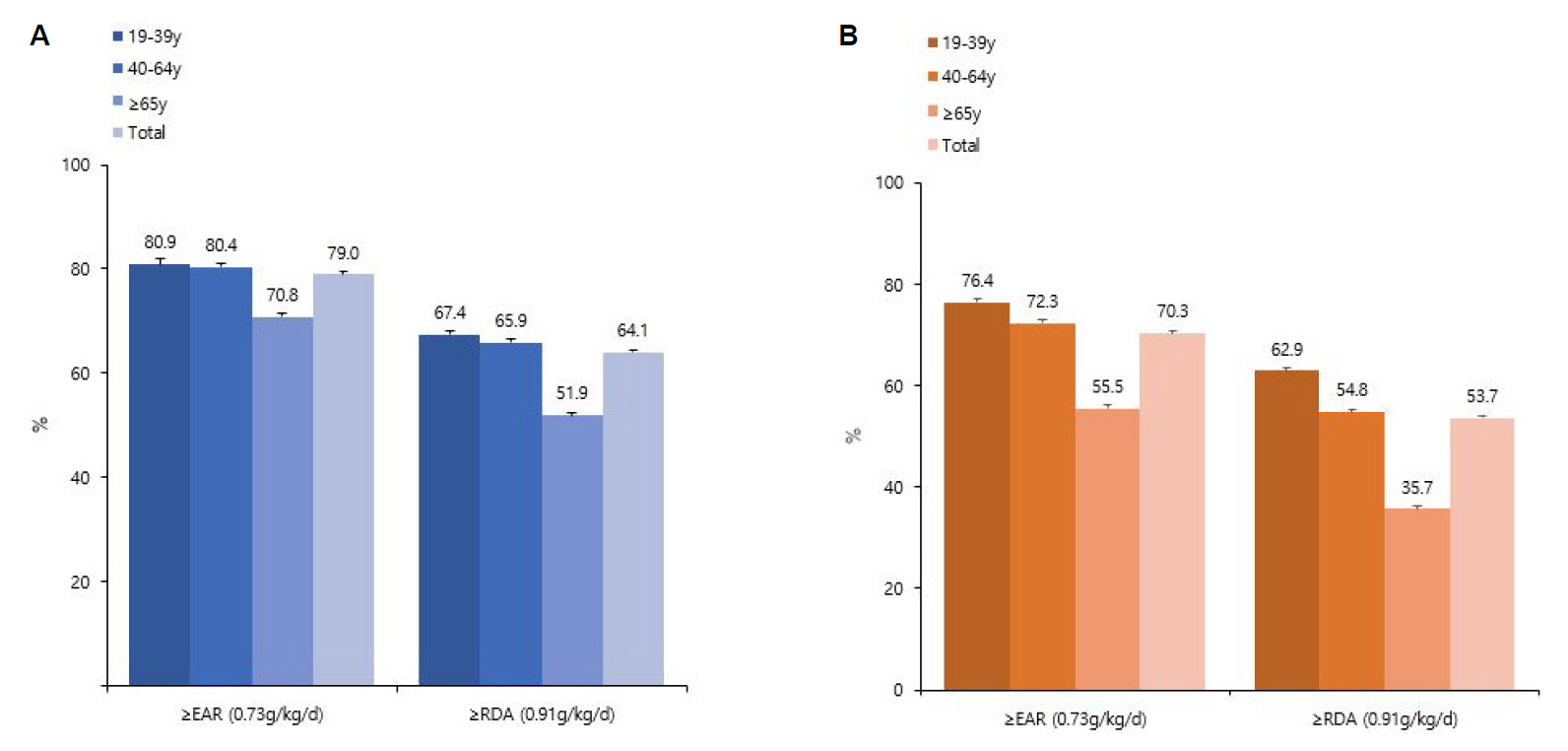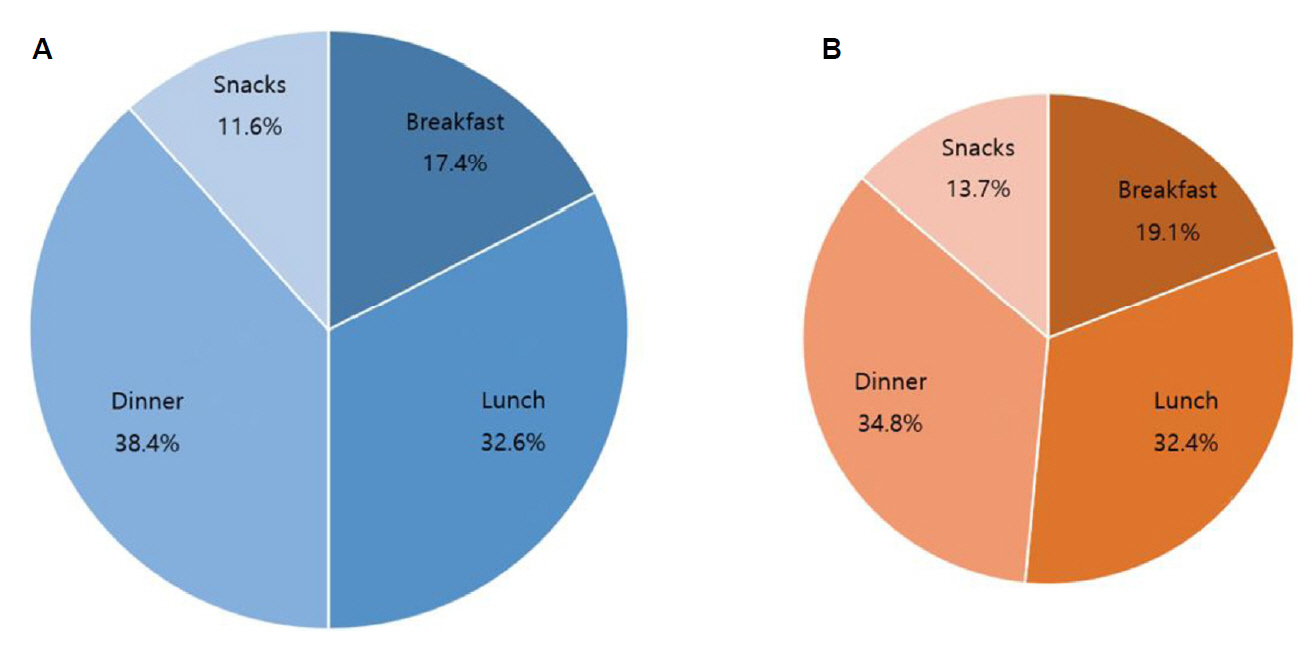Korean J Health Promot.
2021 Jun;21(2):63-72.
Protein Intake by Korean Adults through Meals
- Affiliations
-
- 1Department of Family Medicine, Seoul Paik Hospital, Inje University College of Medicine, Seoul, Korea
Abstract
- Background
This study aimed to evaluate the adequacy of protein intake through meals and present the major protein sources of Korean adults.
Methods
Cross-sectional data of 15,639 adults aged 19 years or older from the 2016-2018 Korea National Health and Nutrition Examination Survey were obtained. The total, animal, plant protein intakes were assessed using 1-day 24-hour recall. The distinction between breakfast, lunch, and dinner was based on the subjective answers of the participants.
Results
The adequacy of protein intake based on the Recommended Nutrient Intake was 67.4±1.2% and 62.9±1.1% in young men and women, respectively; it was 51.9±1.4% and 35.7±1.3% in older men and women, respectively. For men, the proportions of proteins through meals were 17.4±0.3%, 32.6±0.3%, 38.4±0.3%, and 11.6±0.2% for breakfast, lunch, dinner, and snacks, respectively. The women showed a similar distribution. In both men and women, as the age group progressed from the young (10.9±0.4 g/day, 12.2±0.4%) to the old (16.9±0.3 g/day, 27.3±0.4%), their intake of proteins and their proportions in meals taken as breakfast also increased, while their dinner protein intake and proportion decreased. The highest-ranked and the 2nd highest-ranked protein sources among the young and middle-aged groups were meat and grains, respectively; the third sources were fish and shellfish. In the old-age group, grains were the highest-ranked protein sources across all three meals.
Conclusions
Despite the increase in protein intake, one out of three young people and two out of three older adults in Korea had inadequate protein intake and uneven meal distributions of protein intake.
Figure
Reference
-
1. Oh C, Jeon BH, Reid Storm SN, Jho S, No JK. The most effective factors to offset sarcopenia and obesity in the older Korean:physical activity, vitamin D, and protein intake. Nutrition. 2017; 33:169–73.2. Korea Disease Control and Prevention Agency. Korea Health Statistics 2018: Korea National Health and Nutrition Examination Survey (KNHANES VII-3) [Internet]. Cheongju: Korea Disease Control and Prevention Agency;2018. [cited May 19, 2021]. Available from: https://knhanes.kdca.go.kr/knhanes/sub03/sub03_02_05.do.3. Park HA. Animal and plant protein intake and socioeconomic status in young and middle-aged korean adults. Korean J Health Promot. 2020; 20(2):70–8.
Article4. Loenneke JP, Loprinzi PD, Murphy CH, Phillips SM. Per meal dose and frequency of protein consumption is associated with lean mass and muscle performance. Clin Nutr. 2016; 35(6):1506–11.
Article5. Mamerow MM, Mettler JA, English KL, Casperson SL, Arentson-Lantz E, Sheffield-Moore M, et al. Dietary protein distribution positively influences 24-h muscle protein synthesis in healthy adults. J Nutr. 2014; 144(6):876–80.
Article6. Areta JL, Burke LM, Ross ML, Camera DM, West DW, Broad EM, et al. Timing and distribution of protein ingestion during prolonged recovery from resistance exercise alters myofibrillar protein synthesis. J Physiol. 2013; 591(9):2319–31.
Article7. Moore DR, Areta J, Coffey VG, Stellingwerff T, Phillips SM, Burke LM, et al. Daytime pattern of post-exercise protein intake affects whole-body protein turnover in resistance-trained males. Nutr Metab (Lond). 2012; 9(1):91.
Article8. Korea Disease Control and Prevention Agency. Korea Health Statistics 2019: Korea National Health and Nutrition Examination Survey (KNHANES VIII-1) [Internet]. Cheongju: Korea Disease Control and Prevention Agency;2019. [cited May 19, 2021]. Available from: https://knhanes.kdca.go.kr/knhanes/sub03/sub03_02_05.do.9. Park HA. Adequacy of protein intake among Korean elderly: an analysis of the 2013-2014 Korea national health and nutrition examination survey data. Korean J Fam Med. 2018; 39(2):130–4.
Article10. Korean Nutrition Society. 2020 Dietary Reference Intakes for Koreans (KDRIs): Energy and Macronitrients. Sejong: Ministry of Health and Welfare;2020.11. Wolfe RR. The role of dietary protein in optimizing muscle mass, function and health outcomes in older individuals. Br J Nutr. 2012; 108 Suppl 2:S88–93.
Article12. Koopman R. Dietary protein and exercise training in ageing. Proc Nutr Soc. 2011; 70(1):104–13.
Article13. Deutz NE, Bauer JM, Barazzoni R, Biolo G, Boirie Y, Bosy-Westphal A, et al. Protein intake and exercise for optimal muscle function with aging: recommendations from the ESPEN Expert Group. Clin Nutr. 2014; 33(6):929–36.
Article14. Japanese Association on Sarcopenia and Frailty. Practice guideline for Sarcopenia. Tokyo: Life science Press;2017. p. 34–5.15. Bauer J, Biolo G, Cederholm T, Cesari M, Cruz-Jentoft AJ, Morley JE, et al. Evidence-based recommendations for optimal dietary protein intake in older people: a position paper from the PROT-AGE study group. J Am Med Dir Assoc. 2013; 14(8):542–59.
Article16. Berryman CE, Lieberman HR, Fulgoni VL 3rd, Pasiakos SM. Protein intake trends and conformity with the dietary reference intakes in the United States: analysis of the national health and nutrition examination survey, 2001-2014. Am J Clin Nutr. 2018; 108(2):405–13.
Article17. Ishikawa-Takata K, Takimoto H. Current protein and amino acid intakes among Japanese people: analysis of the 2012 national health and nutrition survey. Geriatr Gerontol Int. 2018; 18(5):723–31.
Article18. Paddon-Jones D, Campbell WW, Jacques PF, Kritchevsky SB, Moore LL, Rodriguez NR, et al. Protein and healthy aging. Am J Clin Nutr. 2015; 101(6):1339S–45S.
Article19. Hoy MK, Clemens JC, Moshfegh AJ. Protein Intake of Adults. What We Eat in America, NHANES 2015-2016 [Internet]. Washington, D.C.: Department of Agriculture;2021. [cited May 31, 2021]. Available from: https://www.ars.usda.gov/ARSUserFiles/80400530/pdf/DBrief/29_Protein_Intake_of_Adults_1516.pdf.20. Gaytán-González A, Ocampo-Alfaro MJ, Torres-Naranjo F, González-Mendoza RG, Gil-Barreiro M, Arroniz-Rivera M, et al. Dietary protein intake patterns and inadequate protein intake in older adults from four countries. Nutrients. 2020; 12(10):3156.
Article21. Moore DR, Churchward-Venne TA, Witard O, Breen L, Burd NA, Tipton KD, et al. Protein ingestion to stimulate myofibrillar protein synthesis requires greater relative protein intakes in healthy older versus younger men. J Gerontol A Biol Sci Med Sci. 2015; 70(1):57–62.
Article22. Schoenfeld BJ, Aragon AA. How much protein can the body use in a single meal for muscle-building? Implications for daily protein distribution. J Int Soc Sports Nutr. 2018; 15:10.
Article23. Korean Nutrition Society. 2015 Dietary Reference Intakes for Koreans (KDRIs). Seoul: Ministry of Health and Welfare;2015.24. Berrazaga I, Micard V, Gueugneau M, Walrand S. The role of the anabolic properties of plant- versus animal-based protein sources in supporting muscle mass maintenance: a critical review. Nutrients. 2019; 11(8):1825.
Article25. Song M, Fung TT, Hu FB, Willett WC, Longo VD, Chan AT, et al. Association of animal and plant protein intake with all-cause and cause-specific mortality. JAMA Intern Med. 2016; 176(10):1453–63.
Article26. Budhathoki S, Sawada N, Iwasaki M, Yamaji T, Goto A, Kotemori A, et al. Association of animal and plant protein intake with all-cause and cause-specific mortality in a Japanese cohort. JAMA Intern Med. 2019; 179(11):1509–18.
Article27. Chung SJ, Lee Y, Lee S, Choi K. Breakfast skipping and breakfast type are associated with daily nutrient intakes and metabolic syndrome in Korean adults. Nutr Res Pract. 2015; 9(3):288–95.
Article28. Yasuda J, Asako M, Arimitsu T, Fujita S. Skipping breakfast is associated with lower fat-free mass in healthy young subjects: a cross-sectional study. Nutr Res. 2018; 60:26–32.
Article
- Full Text Links
- Actions
-
Cited
- CITED
-
- Close
- Share
- Similar articles
-
- Adequacy of Protein Intake among Korean Elderly: An Analysis of the 2013–2014 Korea National Health and Nutrition Examination Survey Data
- Effect of Pre-meal Water Consumption on Energy Intake and Satiety in Non-obese Young Adults
- Regional differences in protein intake and protein sources of Korean older adults and their association with metabolic syndrome using the 2016–2019 Korea National Health and Nutrition Examination Surveys: a cross-sectional study
- Dietary habits of Koreans aged 95 years and older residing in rural and metropolitan areas
- Animal and Plant Protein Intake and Socioeconomic Status in Young and Middle-Aged Korean Adults



